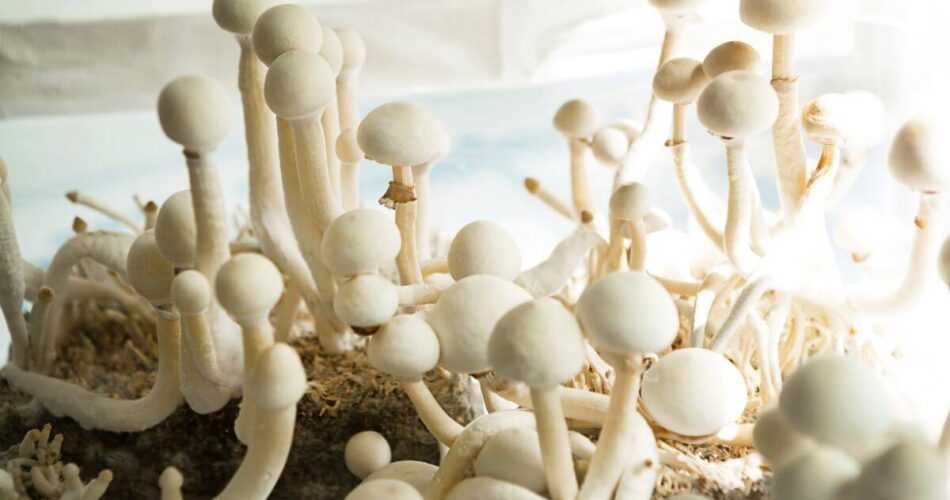A relatively new species of magic mushroom was discovered in the United States. Psilocybe ovoideocystidiata is a small, brown mushroom that grows in clusters on rotting wood. It is closely related to Psilocybe Cubensis, the most well-known magic mushroom species. Read on to learn more about Psilocybe ovoideocystidiata.
What Is Psilocybe Ovoideocystidiata?
Psilocybe ovoideocystidiata is a psilocybin mushroom and contains the psychoactive compounds psilocybin and psilocin. It is a relatively newly documented psilocybin mushroom − it was first described by Richard V. Gaines in 2003. It’s not clear whether Psilocybe ovoideocystidiata appears in the spring, summer, or fall; nevertheless, usually it grows from April to June. They have also been observed in March and November.
Psilocybe Ovoideocystidiata Appearance
The cap of the mushroom is about 1.5 to 8 cm across, convex and usually is orangish, chestnut, brown or yellowish or brown in color. When the mushroom is young, the cap is usually convex and brown or black, but with time it gets cinnamon brown when wet and beige when it’s dry. Like many psilocybin mushrooms, they tend to exhibit blueish bruising when they’re injured. The gills are adnate and can be white, brown, dark purple brown or lavender in color. Spore print is dark purple brown. The stipe is about 3 to 9 cm long ang equal.
The Mushroom’s Characteristic Features
They usually have small hairs at the bottom and yellowish or bluish tones. They tend to have veil around the middle of the stem. Typically, other psilocybe species have it just under the cap. The taste and smell of Psilocybe ovoideocystidiata is similar to other psilocybe mushrooms and farinaceous, but may be spicy as well.
What Are Psilocybin Mushrooms?
Mushrooms that are high in the psychoactive chemical psilocybin are known as psychedelic psilocybin mushrooms. Psilocybin is a naturally occurring psychotropic compound found in approximately 200 species of fungus. When eaten, psilocybin gives people hallucinations and altered perceptions of reality. Its effects are commonly described as those after using LSD. Psilocybin mushrooms, or “magic mushrooms,” are found in tropical and subtropical climates all around the world. They are now frequently eaten for their hallucinogenic effects.
Psilocybe Ovoideocystidiata Habitat and Distribution
Psilocybe ovoideocystidiata are known to be native psychedelic mushrooms to the eastern Unites States. Their occurrence ranges from Kentucky to Rhode Island and Mississippi. They also occur on the west of the United States, in California and Oregon. They can be found abundantly in the area of the Ohio River valley. This is because they tend to grow in humid places, along rivers and streams, on woody debris, mulch. They tend to avoid direct sunlight, so they are mostly found in shady areas. They have been reported in Europe (Germany and Switzerland).
Psilocybe Ovoideocystidiata Look-Alikes
Sometimes P. Ovoideocystidiata can be confused with another psilocybin mushroom, Psilocybe caerulipes, which is also widely distributed in similar areas. The main difference between these two types of hallucinogenic shroom is that P. caerulipes is generally smaller.
Is Psilocybe Ovoideocystidiata Safe?
Although psilocybin is a relatively safe psychoactive substance, there are some potential risks associated with its use. Some of these risks are physical, while others are psychological. Psilocybin can cause an increase in heart rate and blood pressure, which can be dangerous for people with certain medical conditions. It can also lead to nausea and vomiting. In rare cases, it can cause severe psychological reactions, such as paranoia and anxiety.
Long-term Effects of Using Psilocybin
Long-term negative effects of psilocybin use are not well-known, but there is some evidence that it may lead to psychotic symptoms in vulnerable individuals. Not everyone who takes psilocybin will experience the same effects, but it is important to be aware that psilocybin use can be risky and should not be taken lightly.
Is Psilocybe Ovoideocystidiata Legal?
The mushroom contains psilocybin, a psychedelic compound that can produce hallucinations and altered states of consciousness. Psilocybin is classified as a Schedule I drug by the US Drug Enforcement Administration, meaning that it has a high potential for abuse and no accepted medical use. In recent years, there has been a resurgence of interest in psilocybin-containing mushrooms for their potential therapeutic benefits. Oregon was the first state to decriminalize psilocybin mushrooms to be used in therapies. However, they are still illegal under federal law and in most countries in the world.
Similar Posts:
- Psilocybe Banderillensis: What Is It? Discover the Species of Mushrooms From the Pluteus Genus
- Psilocybe Bohemica: A Psilocybin Mushroom From Europe. All the Information You Need to Know About the Species
- Psilocybe Caerulipes – Description of a Magic Mushroom, Its Potency and Habitat
- Psilocybe Muliercula: Discover a Rare and Potent Magic Mushroom
- Psilocybe Allenii Mushroom – Spore Print, Habitat, Identification
- Psilocybe Guilartensis: A Potent Psilocybin Mushroom From Puerto Rico. Morphology, Habitat & Interesting Facts
- Psilocybe Mescaleroensis: Potent Magic Mushroom Species






